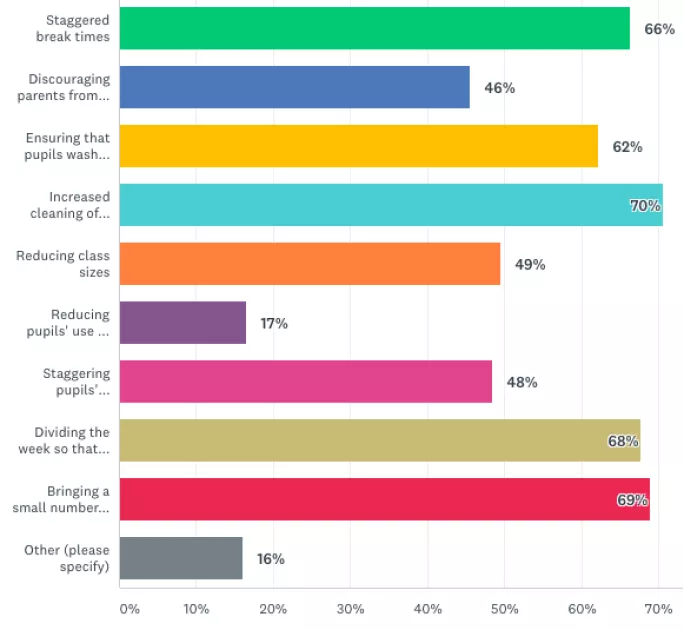Almost three-quarters of school staff say social distancing in UK schools is “impossible”, according to a Tes survey.
Of the more than 17,000 UK teachers and other school staff who responded to the online poll this week, just 0.3 per cent thought social distancing in schools would be “easy” and only 4 per cent said it would be “possible in certain circumstances”.
A further 21 per cent said it would be “difficult”, but a huge majority - 74 per cent - of UK school staff consider it “impossible”.
Exclusive: ‘Give PPE to all of us’ say 3/4 school staff
PM: Plan to reopen schools will be set out ‘next week’
Safety: DfE summons teaching unions to school reopening talks
News: The children making social distancing ‘fun’
The results come on the day that teaching unions are to attend a Department for Education planning meeting to discuss the safest way to end the school shutdown, with plans for how to reopen due to be set out by the prime minister next week.
Mary Bousted, joint general secretary of the NEU teaching union, said: “Any idea that workplaces have to social distance, and buses do, and supermarkets do - yet schools don’t - is not a runner.
“I don’t think we have even begun to consider as a society how profoundly this is going to change education.”
The Tes survey results also shed light on what measures staff think would be practical when their schools reopen, to help prevent the spread of Covid-19.
Increased cleaning of classroom surfaces, including desks and handles, was seen as most practical and was backed by 70 per cent of school staff, while 69 per cent backed bringing just a small number of “priority year groups” back to school for a period of time, with everyone else staying at home.
A similar proportion - 68 per cent - think dividing the week so that only some year groups attend each day is practical, while 62 per cent say the same for ensuring that pupils frequently wash their hands with soap and water for 20 seconds.
But less than half of school staff favoured measures such as staggering pupils’ movements around the school to reduce large groups gathering (48 per cent) and discouraging parents from gathering at the school gate (46 per cent).
And only 17 per cent of teachers thought it would be practical to reduce pupils’ use of public transport to school.
Staff from primary, secondary and special schools responded. But on social distancing, there was little variation by type of school, although a very slightly smaller proportion of secondary staff - 72 per cent - thought it was “impossible”.
Geoff Barton, Association of School and College Leaders general secretary, said: “Social distancing would be pretty much impossible to manage in schools strictly and consistently all of the time because of the constraints on spaces, and the reality that there is a mix of age groups and behaviours.
“This is particularly the case with very young children, or those with complex needs, who are less able to understand or observe social distancing.”
Dr Bousted added: “We’re going to have to reconceive education in terms of considerably reduced pupil populations in schools, and with things like different opening and finishing times for different sets of pupils.
“We’re also going to have to consider pupils coming in on a rota basis, and the fact that there will be fewer staff because some will be in vulnerable groups or living with people in vulnerable groups and self-isolating.”
The DfE says it has published “extensive” guidance that outlines current advice on social distancing in schools and says it is looking at how “phased reopening will work”.
A DfE spokesperson said: “We are also working in close consultation with the sector as we consider how to reopen schools, nurseries and colleges when the time is right, and will ensure everyone has sufficient notice to plan and prepare.”






